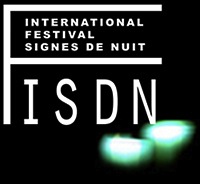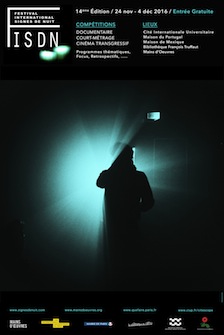 |
|
 |
The 14th International Festival
Signes de Nuit
Paris
November 24 - December 4, 2016
|
|
 |
 |
 |
|
|
|
|
|
|
|
|
****** |
Pier Paolo Pasolini Experimental |
Dimanche 4 décember 2016 / 16 h
Maison du Portugal
André de Gouveia
Cité internationale
universitaire de Paris |
Vivo e coscienza
|
|
 |
Massimo Puliani, Alia Simoncini
Italy
2015 / 0:11:00
The theme is apparently that of seduction. As in "The Anger" where the
portrait of Marilyn becomes a metaphor, here the guy from the body
"alive" (Southern Europe) and the woman from the "individual
conscience", are used as a pretext by Pasolini for a strong social
commentary : intolerance of the company for diversity and otherness,
the ideological confrontation between those who yearn for freedom and
those who want to suppress it through new and old barbarism. It is
they that are updated in this docu / drama shooting style mounting
Pasolini. The film is dedicated to the Resistance.
|
|
|
Beneath the wide wide Heaven
|
|
 |
Hisham Bizri
Italy
2015 / 0:15:00
Pier Paolo Pasolini plays the role of the director as conveyor of
human experience. The director is constantly watching, thinking,
feeling... all in hopes that the film, once it stands alone, will be
sufficient and whole. And on him is the burden of describing through
image and sound the human experience.
|
|
|
PierPaolo
|
|
 |
Miguel Angel Barroso
Italy
2016 / 1:16:00
PierPaolo tells us about Pier Paolo Pasolini’s childhood and youth
years, through the main characters of his life: his father Carlo
Alberto, with whom he has a difficult love-hatred relationship; his
mother, he’ll be very close with until his final days, they even lived
together in the same house; his younger brother Guido, who joins the
partisans during World War II and ends up murdered under strange
circumstances; the delicate romantic and friendship relationship with
two women: violinist Pina Kalz, a war refugee, and schoolteacher
María, who went steady with him; and his deep infatuation with a
peasant boy named Toni, he will keep this friendship throughout his
life.
PierPaolo also takes us through the places that so marked his life
(Belluno, Casarsa della Delizia, Scandiano, Conegliano, Sacile, Parma,
Idria, Bologna, Versutta…) as since birth, Pasolini, became nomadic
due to the moving from city to city, because his father was an army
officer and every few months was appointed to new barracks.
PierPaolo nous raconte l’enfance et la jeunesse de Pier Paolo
Pasolini à travers les personnages clés de sa vie : son père Carlo
Alberto, avec lequel il entretient une relation d’amour et de haine;
sa mère, dont il restera toujours proche, au point de vivre sous le
même toit ; son frère cadet Guido, qui deviendra partisan pendant la
Seconde Guerre Mondiale, assassiné dans des circonstances étranges ;
ses relations délicates d’amour et d’amitié avec deux femmes : la
violoniste Pina Kalz, une réfugiée de guerre et l’institutrice Maria
avec laquelle il se fiancera officiellement ; et son amour profond
pour un jeune paysan du nom de Toni dont il conservera l’amitié toute
sa vie.
PierPaolo nous emmène aussi dans les lieux qui ont marqué sa vie
(Belluno, Casarsa della Delizia, Scandiano, Conegliano, Sacile, Parma,
Idrija, Bologne, Versutta…) car depuis sa naissance, Pasolini est un
nomade allant de ville en ville au gré des affectations de son père
militaire envoyé dans une nouvelle caserne tous les quelques mois.
|
| |
|
|